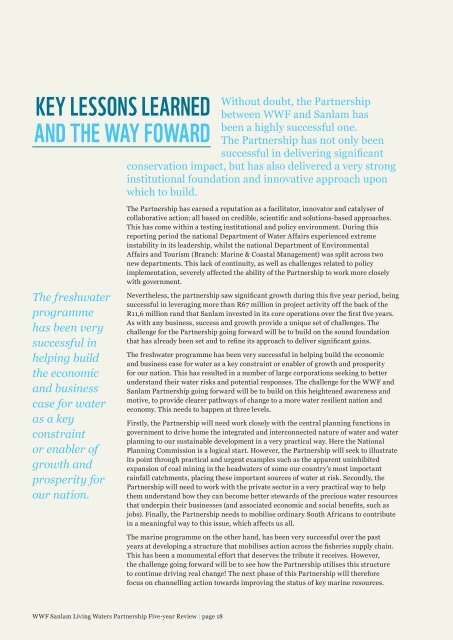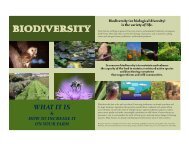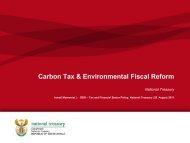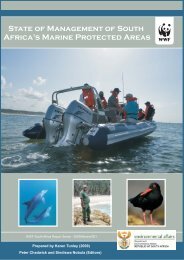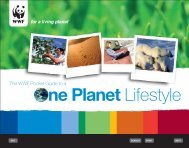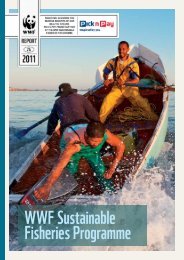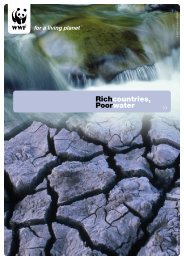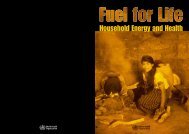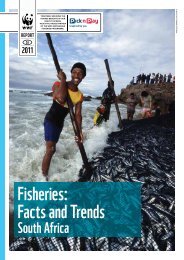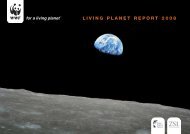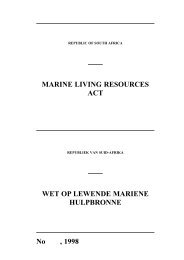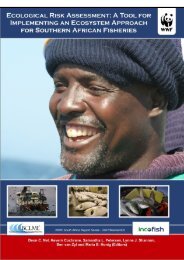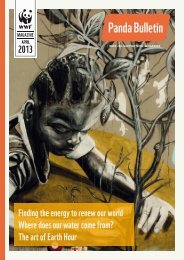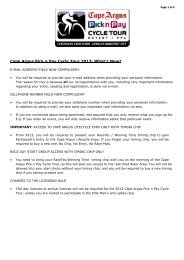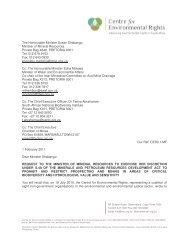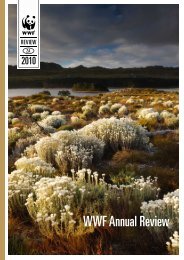WWF Sanlam Living Waters Partnership - WWF South Africa
WWF Sanlam Living Waters Partnership - WWF South Africa
WWF Sanlam Living Waters Partnership - WWF South Africa
You also want an ePaper? Increase the reach of your titles
YUMPU automatically turns print PDFs into web optimized ePapers that Google loves.
Key LeSSonS LeARned<br />
And the WAy FoWARd<br />
The freshwater<br />
programme<br />
has been very<br />
successful in<br />
helping build<br />
the economic<br />
and business<br />
case for water<br />
as a key<br />
constraint<br />
or enabler of<br />
growth and<br />
prosperity for<br />
our nation.<br />
Without doubt, the <strong>Partnership</strong><br />
between <strong>WWF</strong> and <strong>Sanlam</strong> has<br />
been a highly successful one.<br />
The <strong>Partnership</strong> has not only been<br />
successful in delivering significant<br />
conservation impact, but has also delivered a very strong<br />
institutional foundation and innovative approach upon<br />
which to build.<br />
The <strong>Partnership</strong> has earned a reputation as a facilitator, innovator and catalyser of<br />
collaborative action; all based on credible, scientific and solutions-based approaches.<br />
This has come within a testing institutional and policy environment. During this<br />
reporting period the national Department of Water Affairs experienced extreme<br />
instability in its leadership, whilst the national Department of Environmental<br />
Affairs and Tourism (Branch: Marine & Coastal Management) was split across two<br />
new departments. This lack of continuity, as well as challenges related to policy<br />
implementation, severely affected the ability of the <strong>Partnership</strong> to work more closely<br />
with government.<br />
Nevertheless, the partnership saw significant growth during this five year period, being<br />
successful in leveraging more than R67 million in project activity off the back of the<br />
R11,6 million rand that <strong>Sanlam</strong> invested in its core operations over the first five years.<br />
As with any business, success and growth provide a unique set of challenges. The<br />
challenge for the <strong>Partnership</strong> going forward will be to build on the sound foundation<br />
that has already been set and to refine its approach to deliver significant gains.<br />
The freshwater programme has been very successful in helping build the economic<br />
and business case for water as a key constraint or enabler of growth and prosperity<br />
for our nation. This has resulted in a number of large corporations seeking to better<br />
understand their water risks and potential responses. The challenge for the <strong>WWF</strong> and<br />
<strong>Sanlam</strong> <strong>Partnership</strong> going forward will be to build on this heightened awareness and<br />
motive, to provide clearer pathways of change to a more water resilient nation and<br />
economy. This needs to happen at three levels.<br />
Firstly, the <strong>Partnership</strong> will need work closely with the central planning functions in<br />
government to drive home the integrated and interconnected nature of water and water<br />
planning to our sustainable development in a very practical way. Here the National<br />
Planning Commission is a logical start. However, the <strong>Partnership</strong> will seek to illustrate<br />
its point through practical and urgent examples such as the apparent uninhibited<br />
expansion of coal mining in the headwaters of some our country’s most important<br />
rainfall catchments, placing these important sources of water at risk. Secondly, the<br />
<strong>Partnership</strong> will need to work with the private sector in a very practical way to help<br />
them understand how they can become better stewards of the precious water resources<br />
that underpin their businesses (and associated economic and social benefits, such as<br />
jobs). Finally, the <strong>Partnership</strong> needs to mobilise ordinary <strong>South</strong> <strong>Africa</strong>ns to contribute<br />
in a meaningful way to this issue, which affects us all.<br />
The marine programme on the other hand, has been very successful over the past<br />
years at developing a structure that mobilises action across the fisheries supply chain.<br />
This has been a monumental effort that deserves the tribute it receives. However,<br />
the challenge going forward will be to see how the <strong>Partnership</strong> utilises this structure<br />
to continue driving real change! The next phase of this <strong>Partnership</strong> will therefore<br />
focus on channelling action towards improving the status of key marine resources.<br />
<strong>WWF</strong> <strong>Sanlam</strong> <strong>Living</strong> <strong>Waters</strong> <strong>Partnership</strong> Five-year Review | page 18


